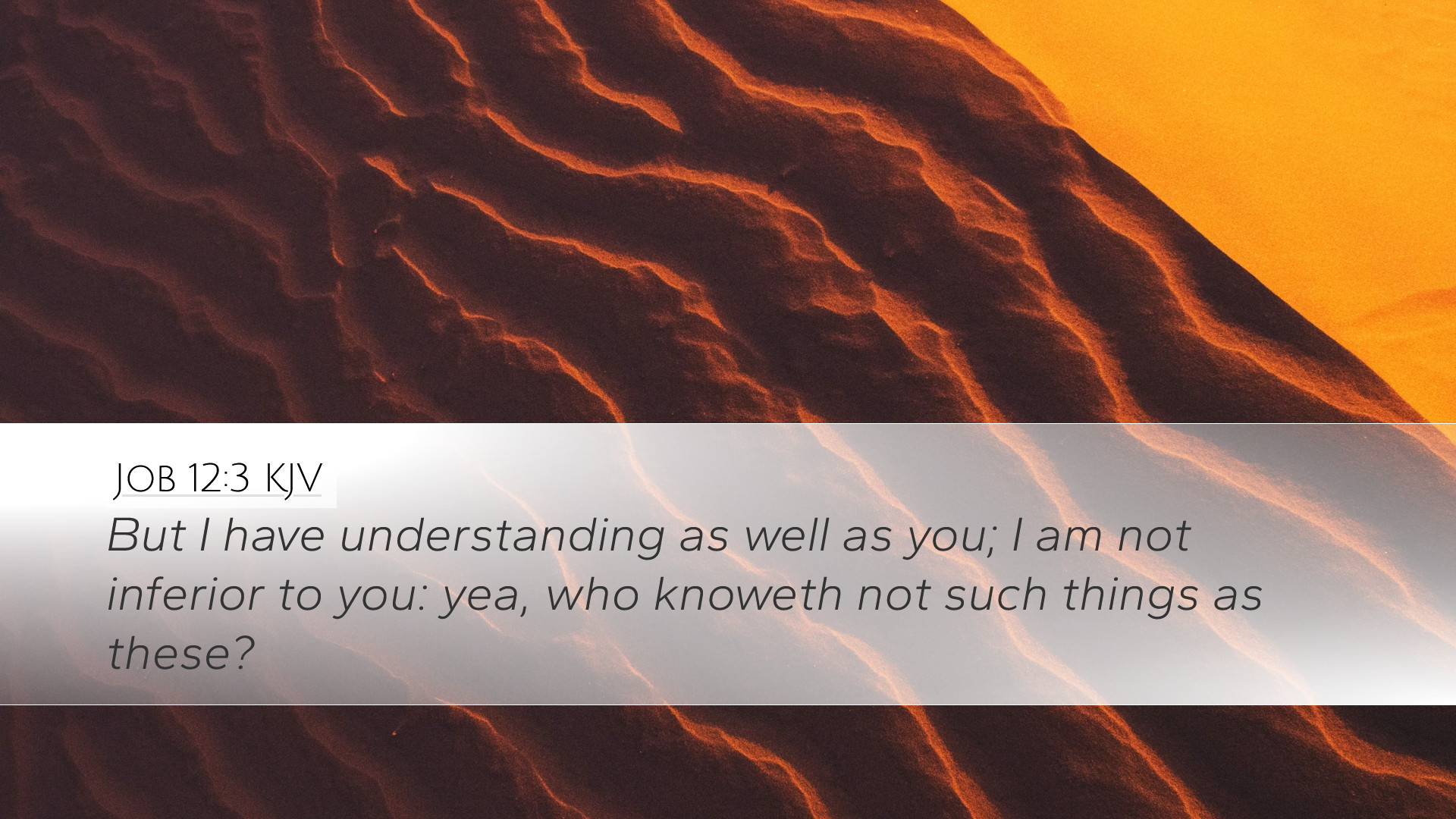Old Testament
Genesis Exodus Leviticus Numbers Deuteronomy Joshua Judges Ruth 1 Samuel 2 Samuel 1 Kings 2 Kings 1 Chronicles 2 Chronicles Ezra Nehemiah Esther Job Psalms Proverbs Ecclesiastes Song of Solomon Isaiah Jeremiah Lamentations Ezekiel Daniel Hosea Joel Amos Obadiah Jonah Micah Nahum Habakkuk Zephaniah Haggai Zechariah MalachiJob 12:3
Job 12:3 KJV
But I have understanding as well as you; I am not inferior to you: yea, who knoweth not such things as these?
Job 12:3 Bible Commentary
Commentary on Job 12:3
Job 12:3 states: "But I have understanding as well as you; I am not inferior to you: yea, who knoweth not such things as these?" This verse encapsulates Job's response to his friends and speaks volumes about human understanding, wisdom, and the nature of suffering.
Context and Overview
The Book of Job addresses profound themes of suffering, divine justice, and the human condition. Job, having experienced immense loss and anguish, faces his friends who claim to possess wisdom. In this context, Job asserts his own insight, challenging his friends' simplistic views on divine retribution.
Insights from Public Domain Commentaries
Matthew Henry's Commentary
Henry emphasizes Job’s declaration of understanding to illustrate that true wisdom and knowledge are not solely the possessions of the learned or those in positions of authority. He highlights the irony in Job’s friends, who, despite their scholarly appearance, fail to grasp the complexity of Job's situation. Henry writes:
"Job here asserts his equal understanding with his friends. It is a great mistake to think that our learning or experience gives us an exclusive hold on wisdom or truth. Job understands their pretenses and the inadequacy of their arguments."
Moreover, Henry points out that Job's rhetorical question, "who knoweth not such things as these?" directs attention to common knowledge, suggesting that Job feels underestimated by his peers.
Albert Barnes' Notes on the Bible
Barnes analyzes the passage by elaborating on the nature of Job's knowledge. He notes that Job speaks not from a place of pride but from painful experience:
"Job does not boast of having intellect or insight that is inherently superior, but rather that through suffering and adversity, he has gained a perspective that is profound and insightful."
Barnes reminds readers that Job’s equality in understanding is a profound challenge to the often-myopic view of theology that equates suffering with God’s displeasure. He urges the audience to consider the implications of Job’s assertion that wisdom can come from unexpected sources, especially amidst suffering.
Adam Clarke's Commentary
Clarke provides a detailed analysis of the text, highlighting its implications for understanding human suffering. He notes:
"Job recognizes that human experience and insight are capable of conveying truth, often more effectively than traditional learning."
In Clarke's view, the statement reflects a necessary humility in theological discourse. He emphasizes that while knowledge is vital, it is the application of that knowledge—particularly in the context of empathy and suffering—that holds true value. He invites believers to embrace the complexities of life experiences, believing that God operates beyond human understanding.
Theological Implications
The assertion made by Job in this verse raises significant theological questions regarding suffering, divine justice, and the nature of wisdom:
- The Nature of Wisdom: Wisdom isn't merely the accumulation of knowledge but rather the understanding that comes from one's life experiences. Job's painful journey has enriched his insight, showing that true wisdom often emerges from suffering.
- Addressing Misplaced Assumptions: The verse serves as a critique of the idea that one's external circumstances are always indicative of God's favor or displeasure. It challenges the notion that suffering is a direct consequence of sin.
- The Role of Community in Understanding: Job’s dialog with his friends highlights the importance of community in interpreting life’s events. It emphasizes the need for humility and openness to differing perspectives rather than dogmatic assertions of understanding.
Practical Applications for Pastors and Theologians
This commentary on Job 12:3 can serve as a powerful guide for pastors and theologians in their ministry:
- Encouraging Empathy: When ministering to individuals who suffer, emphasize understanding and empathy over quick theological explanations.
- Fostering Open Dialogue: Encourage open discussions within church communities about suffering and faith, allowing space for diverse experiences and insights.
- Teaching about Divine Complexity: Educate congregations on the complexity of God’s workings in the world, challenging simplistic theological frameworks that cause more harm than good.
Conclusion
Job 12:3 serves as a pivotal point in the narrative of Job, highlighting the depth of human experience and the multifaceted nature of wisdom. The combined insights of Matthew Henry, Albert Barnes, and Adam Clarke underscore the need for humility, understanding, and the acknowledgment that suffering and knowledge are integral to the human experience with God.
This commentary aims to encourage deeper reflection on the nature of wisdom, the role of suffering, and the importance of compassionate community in theological discourse. As Job’s friends learn, true understanding often comes from shared experiences and open-hearted dialogue.


